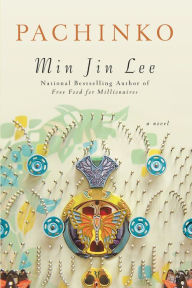
In my most recent book review–on Junot Díaz’s The Brief Wondrous Life of Oscar Wao–I said it was the best novel I had read in quite some time. And it was. But then I read Pachinko, and I think I may have found a new favorite for 2017. Coincidentally, Díaz wrote a wonderfully complimentary blurb about Min Jin Lee’s novel that I found on her website.
As some of my friends know, I’ve been researching a story from 19th century Korean history as the basis for a novel I hope to write (soon?). Pachinko begins just a few brief decades after the conclusion of the period I’m researching, as Japan colonizes Korea and the world heads into two world wars. I picked it up because I had heard good things about it, but also because I’m eager to learn more and more about Korea. I had no idea it was going to be this good.
The story follows an extended Korean family, who for economic and security reasons, is forced to move to Japan, and then for a variety of reasons, never leaves. Starting in 1910, the book is a grand epic stretching over the next eighty years of regional and world history, but stays entirely focused on Sunja and her extended family and their difficulties as Koreans in Japan.
It’s about so many things: family, identity, love, sacrifice, loss, prejudice, suffering, kindness, and, of course, history. The first sentence of the novel is: “History has failed us, but no matter.” And the opening epigraph is a quotation from Charles Dickens about “home.” These ideas drive virtually everything that happens in the lives of Sunja’s family.
In the Acknowledgements, Min Jin Lee writes that it is a story that has been with her for thirty years. I can’t imagine what that must feel like to have an idea within you for so long. But for our sakes as readers, I’m so glad she didn’t abandon it when she grew frustrated with her early versions and came back to it so that we have this wonderful novel now. Please, read it. It’s wonderful.
As some of my friends know, I’ve been researching a story from 19th century Korean history as the basis for a novel I hope to write (soon?). Pachinko begins just a few brief decades after the conclusion of the period I’m researching, as Japan colonizes Korea and the world heads into two world wars. I picked it up because I had heard good things about it, but also because I’m eager to learn more and more about Korea. I had no idea it was going to be this good.
The story follows an extended Korean family, who for economic and security reasons, is forced to move to Japan, and then for a variety of reasons, never leaves. Starting in 1910, the book is a grand epic stretching over the next eighty years of regional and world history, but stays entirely focused on Sunja and her extended family and their difficulties as Koreans in Japan.
It’s about so many things: family, identity, love, sacrifice, loss, prejudice, suffering, kindness, and, of course, history. The first sentence of the novel is: “History has failed us, but no matter.” And the opening epigraph is a quotation from Charles Dickens about “home.” These ideas drive virtually everything that happens in the lives of Sunja’s family.
In the Acknowledgements, Min Jin Lee writes that it is a story that has been with her for thirty years. I can’t imagine what that must feel like to have an idea within you for so long. But for our sakes as readers, I’m so glad she didn’t abandon it when she grew frustrated with her early versions and came back to it so that we have this wonderful novel now. Please, read it. It’s wonderful.
 RSS Feed
RSS Feed
